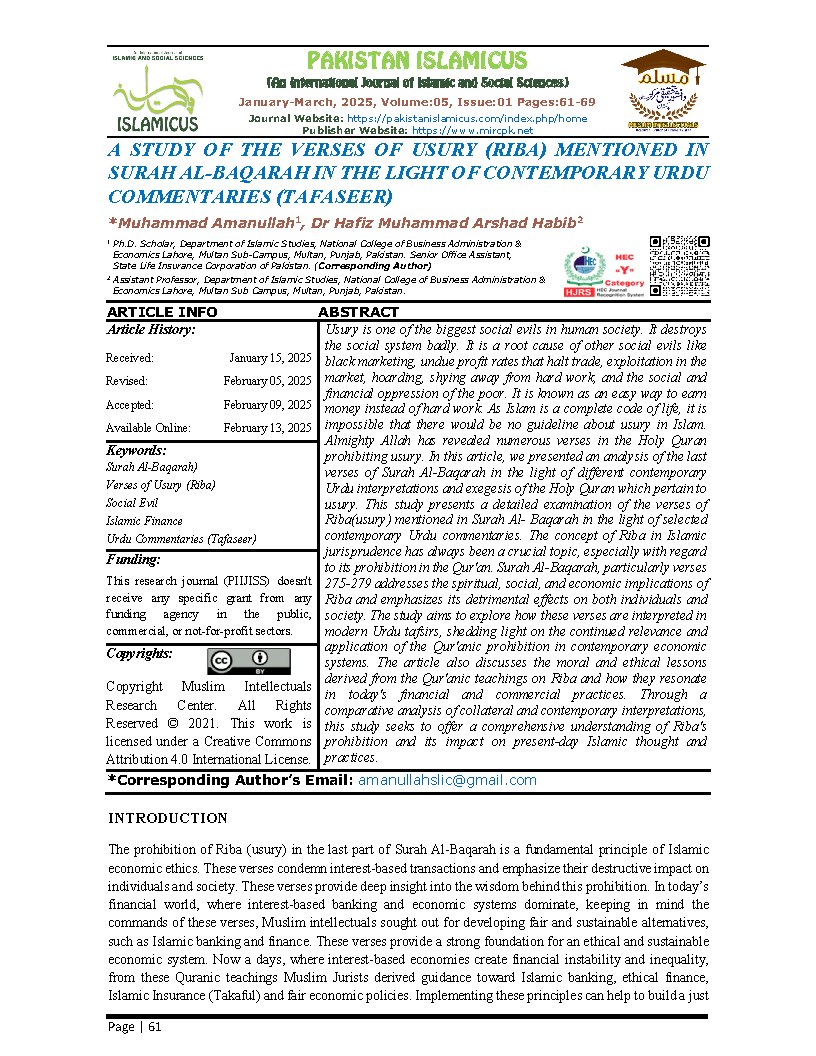A STUDY OF THE VERSES OF USURY (RIBA) MENTIONED IN SURAH AL-BAQARAH IN THE LIGHT OF CONTEMPORARY URDU COMMENTARIES (TAFASEER)
Keywords:
Surah Al-Baqarah, Verses of Usury (Riba), Social Evil, Islamic Finance, Urdu Commentaries (Tafaseer)Abstract
Usury is one of the biggest social evils in human society. It destroys the social system badly. It is a root cause of other social evils like black marketing, undue profit rates that halt trade, exploitation in the market, hoarding, shying away from hard work, and the social and financial oppression of the poor. It is known as an easy way to earn money instead of hard work. As Islam is a complete code of life, it is impossible that there would be no guideline about usury in Islam. Almighty Allah has revealed numerous verses in the Holy Quran prohibiting usury. In this article, we presented an analysis of the last verses of Surah Al-Baqarah in the light of different contemporary Urdu interpretations and exegesis of the Holy Quran which pertain to usury. This study presents a detailed examination of the verses of Riba(usury) mentioned in Surah Al- Baqarah in the light of selected contemporary Urdu commentaries. The concept of Riba in Islamic jurisprudence has always been a crucial topic, especially with regard to its prohibition in the Qur'an. Surah Al-Baqarah, particularly verses 275-279 addresses the spiritual, social, and economic implications of Riba and emphasizes its detrimental effects on both individuals and society. The study aims to explore how these verses are interpreted in modern Urdu tafsirs, shedding light on the continued relevance and application of the Qur'anic prohibition in contemporary economic systems. The article also discusses the moral and ethical lessons derived from the Qur'anic teachings on Riba and how they resonate in today's financial and commercial practices. Through a comparative analysis of collateral and contemporary interpretations, this study seeks to offer a comprehensive understanding of Riba's prohibition and its impact on present-day Islamic thought and practices.
Downloads
References
Al-Qur’an. (n.d.). Surah Aal-e-Imran, 3:130.
Al-Qur’an. (n.d.). Surah An-Nisa, 4:161.
Al-Qur’an. (n.d.). Surah Ar-Rum, 30:39.
Muslim ibn al-Hajjaj. (n.d.). Sahih Muslim (Hadith 1598).
Al-Tirmidhi, M. ‘I. (n.d.). Jami‘al-Tirmidhi (Hadith 1206).
Al-Bukhari, M. I. (n.d.). Sahih al-Bukhari (Hadith 2766).
Muslim ibn al-Hajjaj. (n.d.). Sahih Muslim (Hadith 89).
Ahmad ibn Hanbal. (n.d.). Musnad Ahmad (Vol. 10). Beirut: Dar al-Fikr.
Al-Hakim, M. N. (n.d.). Al-Mustadrak ‘ala al-Sahihayn (Vol. 10). Beirut: Dar al-Ma‘rifah.
Al-Ṭabarānī, S. S. (n.d.). Al-Mu‘jam al-Kabīr (Vol. 10). Beirut: Dar Ihya’ al-Turath al-‘Arabi.
Ibn Majah. (n.d.). Sunan Ibn Majah: Kitab al-Tijarat (Hadith 2274).
Abu Hanifa, N. B. S. (1995). Al-Fiqh al-Akbar (M. al-Khudari, Trans., 2nd ed., pp. 50–55). Lahore: Dar al-Isha‘at.
Shafi‘i, M. B. I. (2003). Al-Risalah fi Usul al-Fiqh (A. S. Afsaruddin, Trans., pp. 89–92). Cairo: Al-Azhar Press.
Malik bin Anas. (1997). Al-Muwatta (A. Bewley, Trans., pp. 202–205). London: Dar al-Taqwa.
Ahmad ibn Hanbal. (1992). Al-Musnad (M. S. al-Azam, Trans., Vol. 1, pp. 150–155). Riyadh: Dar al-Fikr.
Shafi, M. M. (2004). Ma‘ariful Qur’an (Vol. 1, p. 150). Karachi: Maktaba-e-Darul-Uloom.
Maududi, S. A. A. (1979). Tafheem-ul-Qur’an.
Maududi, S. A. A. (1979). Tafheem-ul-Qur’an.
Khan, M. F. (n.d.). Riba and Islamic banking. Retrieved from https://www.researchgate.net/publication/228672983_Riba_and_Islamic_Banking
Al-Qur’an. (n.d.). Surah Al-Baqarah, 2:275.
Al-Qur’an. (n.d.). Surah Al-Baqarah, 2:276.
Al-Qur’an. (n.d.). Surah Al-Baqarah, 2:278.
Al-Qur’an. (n.d.). Surah Al-Baqarah, 2:279.
Al-Raghib al-Isfahani. (2009). Mufridat al-Qur’an (M. S. Kilani, Ed.). Cairo: Dar al-Hadith.
Fairuzabadi, M. Y. (1306 AH). Taj al-‘Arus, Sharah Qamoos (Vol. 10, p. 143). Egypt: Al-Khairiya.
Maududi, S. A. A. (1972). Tafhim al-Qur’an (Vol. 1, p. 276). Lahore: Islamic Publications.
Shafi, M. M. (2004). Ma‘ariful Qur’an (Vol. 1, p. 150). Karachi: Maktaba-e-Darul-Uloom.
Azhari, P. K. S. (1999). Zia-ul-Qur’an (Vol. 1, p. 125). Lahore: Dar-ul-Isha‘at.
Saeedi, S. G. R. (2005). Tafseer Tibyan-ul-Qur’an (Vol. 1, p. 180). Lahore: Dar-ul-Isha‘at.
Ahmad, I. (2000). Bayan-ul-Qur’an (Vol. 1, p. 85). Lahore: Dar-us-Salam.
Al-Qur’an. (n.d.). Surah Al-Hashr, 59:7.
Islahi, A. A. (2000). Tafseer Tabeen-ul-Qur’an (Vol. 1). Lahore: Markazi Maktaba Islami.
Azad, A. K. (1967). Tarjuman-ul-Qur’an (pp. 95–96). Lahore: Sh. Muhammad Ashraf.
Naqshbandi, M. T. (1995). Burhan-ul-Qur’an (Vol. 1, pp. 110–112). Lahore: Maktaba-e-Tayyibia.
Attari, M. Q. (2005). Sirat-ul-Jinan (Vol. 1, pp. 220–222). Karachi: Maktaba-tul-Madina.

Downloads
Published
Issue
Section
License
Copyright (c) 2025 PAKISTAN ISLAMICUS (An International Journal of Islamic & Social Sciences)

This work is licensed under a Creative Commons Attribution 4.0 International License.
This work is licensed under a Creative Commons Attribution 4.0 International License.
































